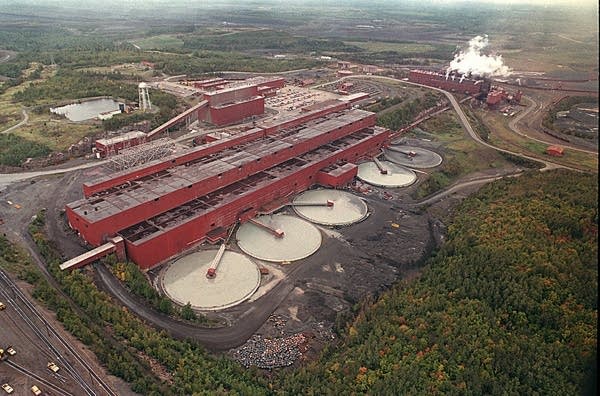Appeals court, legislative auditor scrutinizing MPCA's PolyMet water permit

Go Deeper.
Create an account or log in to save stories.
Like this?
Thanks for liking this story! We have added it to a list of your favorite stories.
Updated: 10:23 p.m. | Posted: 10:40 a.m.
A permit Minnesota regulators issued for the planned PolyMet copper-nickel mine project is under scrutiny from the state's appeals court and its legislative auditor.
The Minnesota Court of Appeals has ordered a hearing on alleged irregularities in how state regulators dealt with federal regulators over a water pollution permit for the mine, which is planned to be built in northern Minnesota.
Turn Up Your Support
MPR News helps you turn down the noise and build shared understanding. Turn up your support for this public resource and keep trusted journalism accessible to all.
The appeals court on Tuesday ordered a lower court to hold an evidentiary hearing as soon as is practical.
The order follows the release of a leaked email sent by a top official at the Minnesota Pollution Control Agency to her counterparts at the U.S. Environmental Protection Agency, asking them not to file written comments on PolyMet's permit during the public comment period. Critics say that kept federal regulators' criticisms off the public record.
The court said in its order that there is "substantial evidence of procedural irregularities" that needs to be examined.
While that investigation won't invalidate the permit, it will allow WaterLegacy and other environmental groups, along with the Fond du Lac Band of Lake Superior Chippewa, which together asked for the review, to cross-examine witnesses and request additional documents, said Paula Maccabee, WaterLegacy's advocacy director.
"This is an extraordinary remedy, for an extraordinary failure of candor and integrity in the permitting process," said Maccabee. "We think it's hugely important that the court get to the bottom of what really happened, and make sure that for Minnesota's first sulfide [copper-nickel] mine, we don't start off on the wrong foot, where companies feel they can take advantage of Minnesota's permitting process."
Maccabee said she plans to ask the MPCA and Gov. Tim Walz for a stay on the permit until the investigation is complete.
Earlier Tuesday, Minnesota's legislative auditor announced it would investigate concerns over how the MPCA handled the same permit.
Rep. Rick Hansen, who chairs the Legislative Audit Commission and a House environment committee, asked for the investigation. Hansen said the allegations of inappropriate handling require "an independent, nonpartisan, third-party investigation."
Legislative auditor Jim Nobles said he requested documents from the Minnesota Pollution Control Agency Friday, and expects to receive them this week.
Nobles said he agreed to Hansen's request "because I think it raises issues and concerns about the processes of government on a very important issue. The PolyMet mine process for approving the permits has been longstanding and very controversial. And so it's another piece of the controversy that I think needs to be addressed, and as expeditiously as possible."
He said he expects the investigation, which will also include interviews with key personnel, will likely take several months.
MPCA spokesperson Darin Broton said that commissioner Laura Bishop welcomes the review.
"PolyMet went through a rigorous 14-year process, and the agency followed the process laid out in its long-standing agreement with the EPA," he said. "But MPCA should have been clearer and more transparent with communications with EPA."
The PolyMet mine would be the first copper-nickel mine in Minnesota, and would be located in Babbitt and Hoyt Lakes, on the edge of the state's Iron Range.
Copper-nickel mining poses potentially more severe environmental risks than the state's long-established iron ore mining industry because the process used to extract the minerals from the sulfide rock can result in acid mine drainage, which can leach heavy metals and other pollutants into nearby surface and groundwater.
That's why the project's water quality permit, which sets limits on the pollutants that can be released into groundwater, lakes and streams, was so heavily scrutinized when the MPCA announced it had been issued in December.
"We believe the MPCA properly considered EPA's reactions to drafts of the permit, and significant changes were made to the permit as a result," said PolyMet spokesperson Bruce Richardson.
"Those changes are reflected in the final permit issued by the MPCA, which meets all applicable state and federal standards. We don't see this independent review impeding our ability to continue to move this project forward."
The appeals court case is one of several lawsuits making its way through state and federal courts seeking to overturn various approvals PolyMet received to build its mine.
Barring a successful legal challenge, PolyMet is clear to begin construction of its mine, once it raises the estimated $1 billion it will cost to build it. Tomorrow, PolyMet is expected to conclude a stock offering to clear debt from its balance sheet, which could result in the Swiss mining and commodities giant Glencore winning majority ownership of the company.
Meanwhile, the Environmental Protection Agency inspector general's office is conducting its own review of whether the agency's staff followed the Clean Water Act in reviewing the PolyMet permit.


